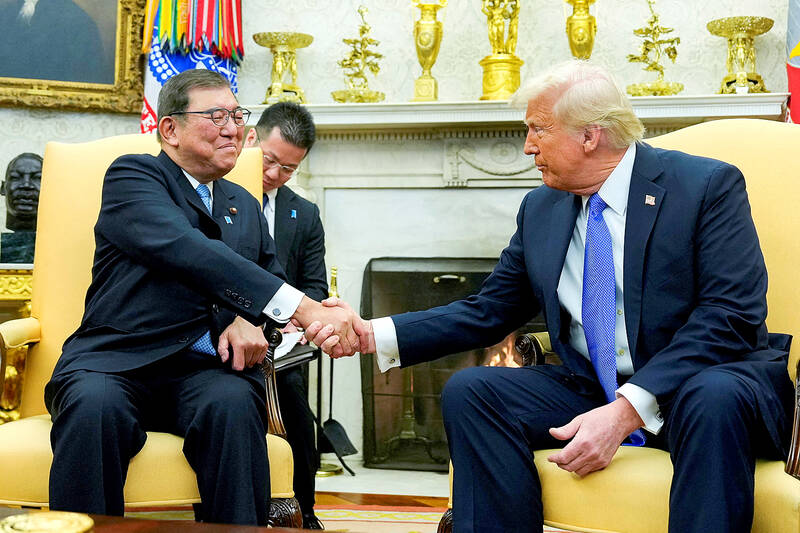Japanese Prime Minister Shigeru Ishiba is considering visiting Washington to meet US President Donald Trump before a mid-month summit of the G7 nations as he seeks a trade deal, the Yomiuri Shimbun reported yesterday.
Japanese officials see signs of progress on easing Trump’s tariffs after repeated visits by top tariff negotiator Japanese Minister of State for Economic and Fiscal Policy Ryosei Akazawa, and said the US side has shown strong interest in Japan’s proposals, the newspaper said, citing Japanese government officials it did not name.
Akazawa is to return to Washington for more talks late this week, after which a decision would be made on a US trip by Ishiba, it said.

Photo: Reuters
The White House and the Japanese Prime Minister’s Office did not immediately respond to requests for comment outside business hours.
Japan, a major US ally, faces a 24 percent tariff from next month unless it can negotiate a bilateral deal. It is also scrambling to find ways to get Washington to exempt its automakers from 25 percent tariffs on automobiles, Japan’s biggest industry and about 8 percent of all Japanese jobs tied to this sector.
Some Japanese officials hope an agreement can be announced in time for Trump’s birthday on Saturday next week, the newspaper said.
After meeting US Secretary of the Treasury Scott Bessent and US Secretary of Commerce Howard Lutnick, Akazawa on Friday said the two sides had “agreed to accelerate the talks and hold another round ahead of the G7 summit,” to be held from June 15 to 17 in Canada.
However, there would be no deal without US concessions on tariffs, including on autos, he said.
Ishiba has said bilateral negotiations were progressing on trade expansion, nontariff measures and economic security, while Tokyo has mentioned possible increases in its purchases of US military equipment and energy, as well as cooperation on shipbuilding and repairing US warships in Japan.
The world’s fourth-largest economy contracted 0.2 percent in the first quarter of this year, adding to pressure on unpopular Ishiba ahead of upper house elections expected for next month.

NEW IDENTITY: Known for its software, India has expanded into hardware, with its semiconductor industry growing from US$38bn in 2023 to US$45bn to US$50bn India on Saturday inaugurated its first semiconductor assembly and test facility, a milestone in the government’s push to reduce dependence on foreign chipmakers and stake a claim in a sector dominated by China. Indian Prime Minister Narendra Modi opened US firm Micron Technology Inc’s semiconductor assembly, test and packaging unit in his home state of Gujarat, hailing the “dawn of a new era” for India’s technology ambitions. “When young Indians look back in the future, they will see this decade as the turning point in our tech future,” Modi told the event, which was broadcast on his YouTube channel. The plant would convert

‘SEISMIC SHIFT’: The researcher forecast there would be about 1.1 billion mobile shipments this year, down from 1.26 billion the prior year and erasing years of gains The global smartphone market is expected to contract 12.9 percent this year due to the unprecedented memorychip shortage, marking “a crisis like no other,” researcher International Data Corp (IDC) said. The new forecast, a dramatic revision down from earlier estimates, gives the latest accounting of the ongoing memory crunch that is affecting every corner of the electronics industry. The demand for advanced memory to power artificial intelligence (AI) tasks has drained global supply until well into next year and jeopardizes the business model of many smartphone makers. IDC forecast about 1.1 billion mobile shipments this year, down from 1.26 billion the prior

People stand in a Pokemon store in Tokyo on Thursday. One of the world highest-grossing franchises is celebrated its 30th anniversary yesterday.

Zimbabwe’s ban on raw lithium exports is forcing Chinese miners to rethink their strategy, speeding up plans to process the metal locally instead of shipping it to China’s vast rechargeable battery industry. The country is Africa’s largest lithium producer and has one of the world’s largest reserves, according to the US Geological Survey (USGS). Zimbabwe already banned the export of lithium ore in 2022 and last year announced it would halt exports of lithium concentrates from January next year. However, on Wednesday it imposed the ban with immediate effect, leaving unclear what the lithium mining sector would do in the